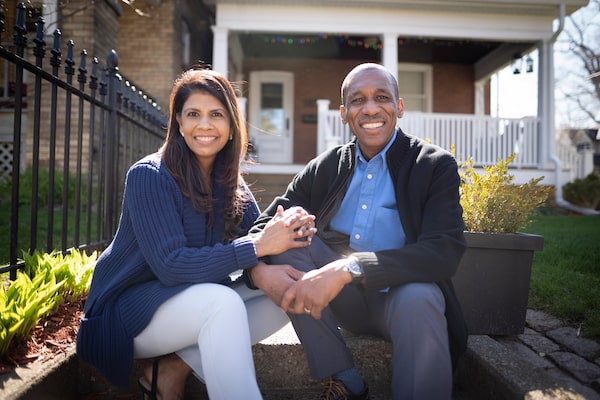
Annalisa and Michael Fortella gifted money to her daughter and son-in-law with no strings attached to help pay for their wedding or a down payment on a house.Peter Power
People are getting married later in life, a trend that’s giving parents who pitch in more time to save. However, financial advisers caution the cost comes at a time when parents might need to earmark the money for themselves.
Being close to retirement “can make it difficult to take a big chunk of money and hand it over, even if it is for a celebration you want to help your child with,” says Jason Heath, managing director of Markham, Ont.-based Objective Financial Partners Inc.
“Often, I end up having discussions with clients about how much they can help out their children, whether it’s for a wedding or otherwise, without compromising their own finances.”
The good news for parents with children heading to the altar is that wedding costs are now spread out among family members. In the past, a bride’s parents traditionally paid for the wedding and reception, and the groom’s parents for the rehearsal dinner and bar. Times have changed. Many couples are chipping in to cover their own wedding costs.
“They have established their careers, which means that they’re also in a very different position financially than couples would have been 30 years ago,” wedding planner Karina Lemke says.
On average, parents pay for 52 per cent of wedding expenses, often contributing a set amount at the start of planning, and the couple pay for 47 per cent, according to the 2020 WeddingWire Newlywed Report. While 60 per cent of parents agree to pay for specific items, such as a dress or the venue, one-third write a cheque that the wedding couple can spend at their discretion, the report states.
That contribution can add up quickly. Six out of 10 couples increase their budget, the report adds, usually because the initial figure was unrealistically low and because they found “must-haves” as they planned. That’s where parents might end up paying more than they had earmarked for their child’s big day, which experts say can have longer-term financial impacts on their retirement plans.
The contribution of families, both financially and in planning, can vary depending on the age or culture of the marrying couple, explains Tracey Manailescu, co-founder of Toronto-based Wedding Planners Institute of Canada.
Families that want a greater say in how the wedding is planned often contribute more, particularly if the details they want to include are more costly, she says. And those costs add up quickly when a wedding package in some of the more popular venues in the Greater Toronto Area can cost $150 or even $290 per guest.
“There are families that have stronger opinions who are going to have more say in the wedding and want to be more involved,” she says. “It’s going to depend on the relationship between the children and the parents, but we are seeing a shift in that the children are more in charge of the plans for the wedding - as it should be because it is their wedding.”
Annalisa and Michael Fortella contributed financially to their daughter’s wedding, and so did the groom’s parents. There were no strings attached, even when the destination wedding in St. Lucia had to be cancelled two years ago and the venue relocated to the Fortella’s backyard in Toronto. A destination reception in St. Lucia took place earlier this year.
“We knew she and her fiancé were saving financially for their wedding, and we said we were going to offer financial help and she could choose to do whatever she wanted,” says Ms. Fortella, 56, a registered nurse with a side business as a wedding and event planner. “It could be used toward her wedding, or it could be used toward a down payment on a house.”
In his practice, Mr. Heath says it has become more common for some parents to contribute to the wedding costs and provide funds to help the couple buy their first home.
“For average families, the question becomes: if a child is getting married at 35 or 40, are they established enough to pay for their own wedding – or should mum and dad still be chipping in?”
Still, he cautions parents to be strategic with their financial contributions. Cash savings or non-registered investments can be easily tapped and tax-free savings are an option, Mr. Heath says. He discourages people from borrowing against their home equity or withdrawing from a registered retirement savings plan (RRSP) to pay for wedding costs.
“Even if there’s an expectation, even a cultural expectation, that a parent contributes to or pays for a wedding, I always discourage people from putting their own finances at risk. It’s really important not to compromise your own retirement, especially for a one-day celebration.”
The Fortellas’ financial goals and retirement plans were not affected by their financial contribution to their daughter’s wedding. They planned for the costs well in advance. The couple saved by investing in guaranteed investment certificates (GICs) and the delay in the reception forced by COVID-19 closures gave them an additional two years to prepare financially.
“Once we had an idea her relationship was heading in a serious direction, we started saving,” Ms. Fortella says.

Interested in more stories about retirement? Sixty Five aims to inspire Canadians to live their best lives, confidently and securely. Read more here and sign up for our weekly Retirement newsletter.